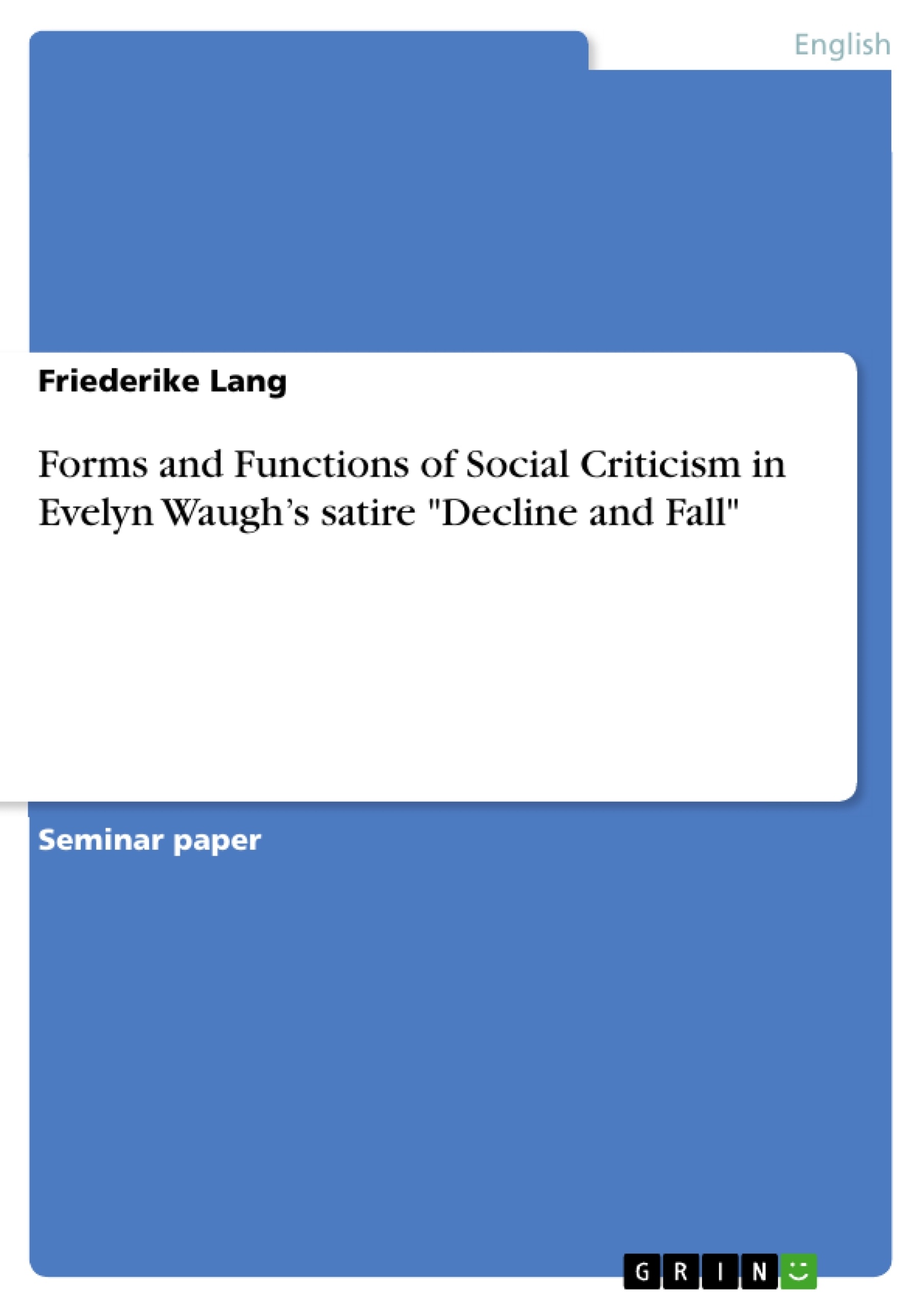The aim of this paper is to analyse how and why Evelyn Waugh as a late modernist writer voiced social criticism in his satire Decline and Fall. To do so, I will firstly demonstrate Evelyn Waugh’s representativeness for the literary genres of modernism and satire. Furthermore, I will examine exemplarily Waugh’s attacks on the education system and the penal system, both represented in the novel by Scone College, Llanabba Castle, Blackstone Gaol and Egdon Heath Prison. I do so based on the assumption that for Waugh it is in those systems that the flaws and faults of British modern society originated.
In the early 20th century, Britain went through a process of change and became more modern. Industrialisation and its rapidly growing cities led society to shake off Victorian ideals and principles. And the Great War from 1914 to 1918 changed the British people forever. Although it was firstly considered as a great adventure and brought about the empowerment of women, it left the country and its society in a profound crisis and raised endless questions. New ways of coping with reality in this age of uncertainty were needed. The literary genre which today is called modernism dealt with this era particularly through experimenting with literary forms and styles. Late modernism on the other hand was more focused on social criticism and preferably used satire as a means of expression.
Evelyn Waugh was a late modernist writer who wrote a number of famous social satires to criticise and to pillory the British society of the 1920s. For him, it was made up of indifferent, overly class conscious people who were incapable of having profound feelings and who placed more importance on status and money than on anything else. Moreover, an overall lack of piety, morals and most importantly boundaries, has led to a self-indulgent, mercenary society in constant decline.
Inhaltsverzeichnis (Table of Contents)
- Introduction
- Evelyn Waugh as a representative of (late) modernism and satire
- Social criticism in Decline and Fall
- The education system
- Scone College
- Llanabba Castle
- The penal system
- Blackstone Gaol
- Egdon Heath Prison
- The education system
- Conclusion
Zielsetzung und Themenschwerpunkte (Objectives and Key Themes)
This paper examines the social critique expressed in Evelyn Waugh's late modernist satire Decline and Fall. It aims to demonstrate Waugh's representation of both modernism and satire, and explore the attacks on the education and penal systems within the novel. The paper focuses on the assumption that these systems represent the flaws and faults of British modern society, highlighting the author's perspective on the decline of societal values and the consequences of disregarding traditional principles.
- The influence of late modernism on Evelyn Waugh's writing
- The use of satire as a tool for social commentary
- The critique of the education system in Britain
- The critique of the penal system in Britain
- The overarching theme of societal decline and the loss of traditional values
Zusammenfassung der Kapitel (Chapter Summaries)
The introduction sets the context for the analysis, exploring the changing landscape of British society in the early 20th century and the emergence of modernism as a literary response to these changes. It highlights the social criticism prevalent in late modernism and Evelyn Waugh's position as a key representative of this movement.
The second chapter delves into Evelyn Waugh's position within the literary genres of modernism and satire. It examines the historical context of modernism, its roots in religious reform, and its evolution as a literary movement. The chapter also explores the development of satire as a literary form, its historical significance, and its relevance in the context of late modernism. It emphasizes the use of satire as a powerful tool for social commentary and its ability to expose societal flaws and deficiencies.
The third chapter focuses on the social criticism in Decline and Fall, specifically examining the author's attacks on the education and penal systems. This chapter explores the representations of Scone College and Llanabba Castle as institutions that embody the failures of the British education system. It then investigates Blackstone Gaol and Egdon Heath Prison as examples of the inadequacies of the penal system, highlighting how these systems perpetuate societal decline and contribute to the erosion of traditional values.
Schlüsselwörter (Keywords)
This work explores the key themes of late modernism, satire, social criticism, education, penal system, societal decline, traditional values, and the British society of the 1920s.
- Quote paper
- Friederike Lang (Author), 2018, Forms and Functions of Social Criticism in Evelyn Waugh’s satire "Decline and Fall", Munich, GRIN Verlag, https://www.grin.com/document/1459301



